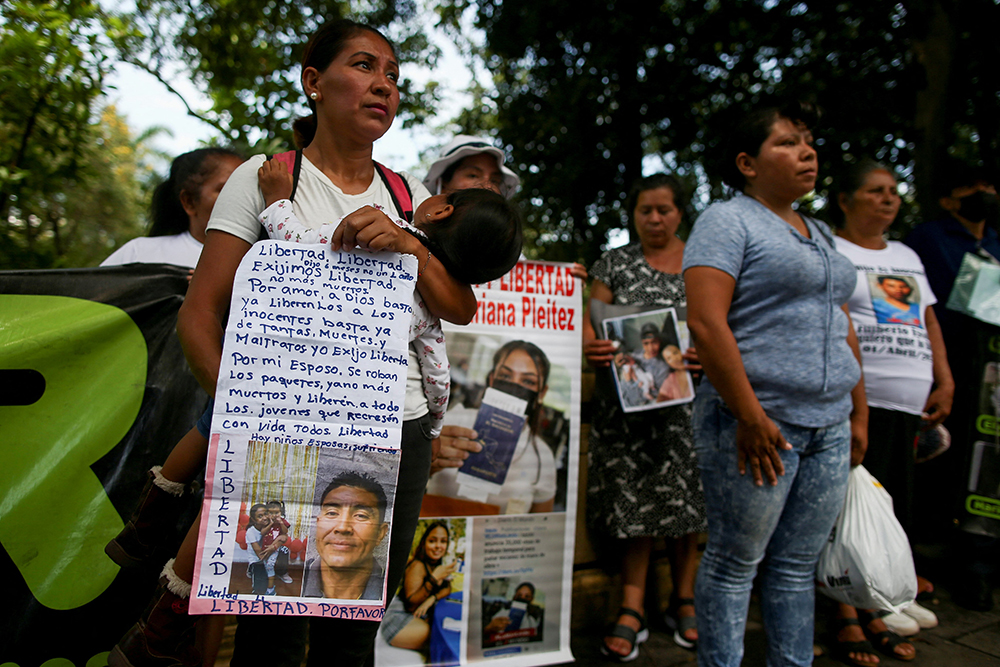
By David Agren
MEXICO CITY (OSV News) — A Salvadoran prelate has urged the country to “avoid the imprisonment of innocent people,” marking rare public comments from clergy on a crackdown against criminal gangs in the Central American country.
Archbishop José Luis Escobar Alas of San Salvador also called for the innocent to be released promptly — as human rights groups raise alarms over arbitrary arrests and a lack of due process during a state of emergency implemented to break the control of gangs carrying out crimes such as extortion and forcing people to flee the country.
In a Mass celebrated Aug. 6 during the feast of the Divine Savior, Archbishop Escobar revealed plans to promote the cause of sainthood for martyrs from the country’s civil war, which ended in 1992. They include Jesuit Father Ignacio Ellacuría — one of six Jesuits slain in a 1989 attack by an elite army unit on their residence. The attack also killed their housekeeper and her teenage daughter.
Archbishop Escobar cited Father Ellacuría as an example for present-day El Salvador, saying, “Violence has struck and led to the deaths of many Salvadorans, mainly the poorest. At present, that violence seems to have almost been overcome, but there are many challenges to be addressed so that history of fratricidal violence is not repeated.”
He continued, “If we want to revert that history from the history of the poor it is necessary … to continue working on the improvement of legal procedures to avoid the imprisonment of innocent people and the prompt release of innocent people already imprisoned. In other words, the administration of prompt and complete justice.”
The call for justice comes as El Salvador pushes ahead with plans for mass trials of suspects arrested in the state of emergency, which was declared in March 2022 and has been renewed every month since.
It also marked a call from the Catholic Church for President Nayib Bukele to reconsider aspects of his heavy-handed security strategy. The strategy has proved popular in a country weary of predatory gangs and once considered the murder capital of the world.
Bukele’s approval rating hovers above 90%, according to polls. A survey by the Jesuit-run José Simeón Cañas Central American University found support for the state of emergency, but respondents didn’t know what rights had been suspended.
The state of emergency granted police broad arrest powers and suspended constitutional guarantees. Lawyers in the country say police detained people on flimsy evidence and alleged officers had arrest quotas. The human rights organization Cristosal documented 153 deaths among arrestees while in state custody.
Bukele built a mega prison to hold the 68,000 people arrested in El Salvador, a nation of 6.3 million people. The legislative assembly recently approved laws allowing for mass trials of detainees.
Salvadoran church leaders have been somewhat reticent in speaking out against the state of emergency — something analysts attribute to the president lashing out at criticism and persecuting political opponents and journalists.
“Those who think differently from the current administration and those who dare to denounce and raise their voices are digitally attacked,” Danilo Flores, coordinator of the human rights observatory at the Central American University, told OSV News in a 2022 interview.
Referring to Archbishop Escobar’s appeal, a Catholic source in El Salvador said that “this is kind of a surprising comment from the archbishop.” The Catholic source said that the Archdiocese of San Salvador recently restarted activity in its human rights office due to the fallout of the state of emergency.
“The bishops haven’t wanted to speak out (and) the rest of the bishops’ conference has not made hardly any statements about what is happening.”
A spokesman for the Archdiocese of San Salvador was unavailable for comment.
